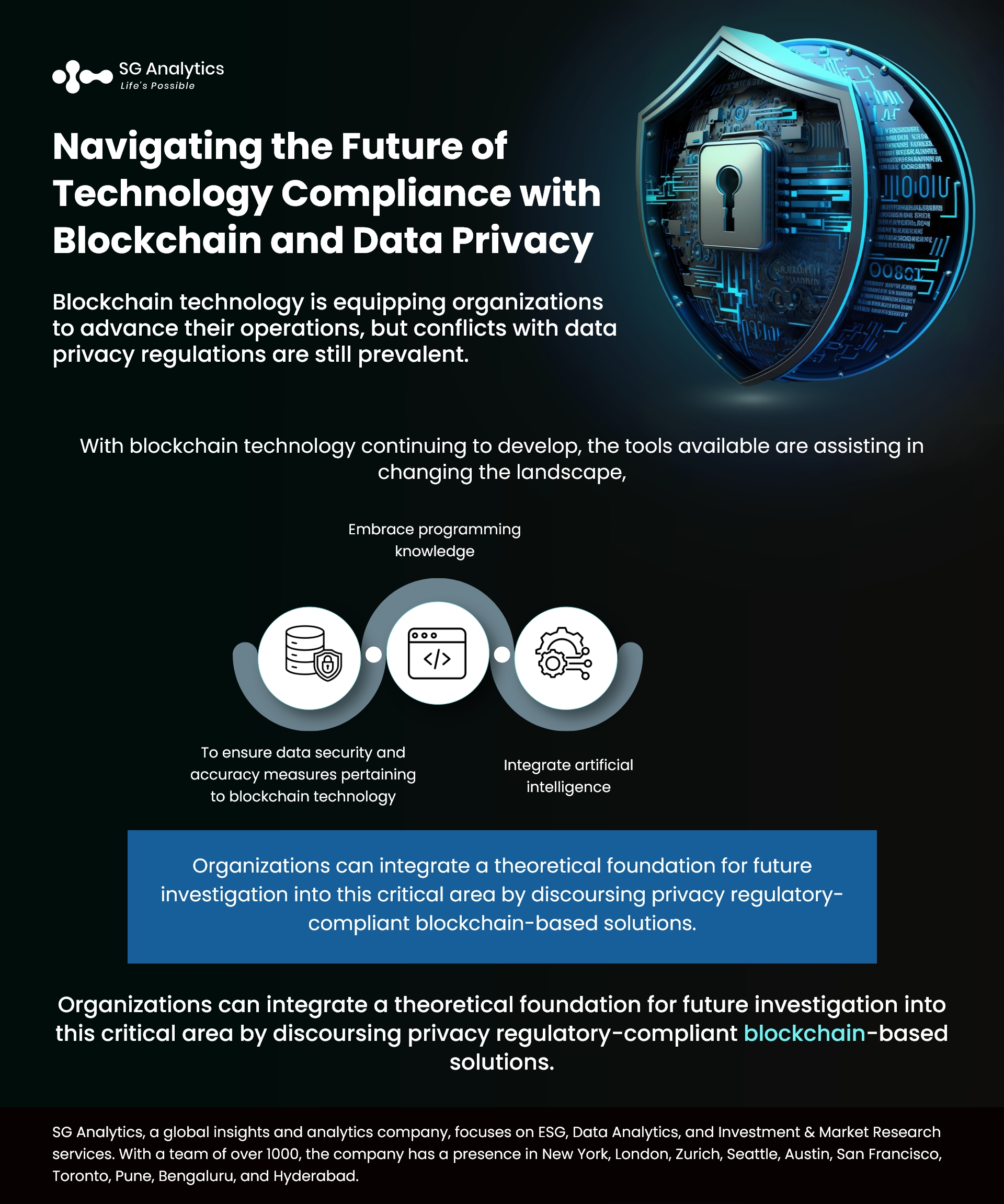Technological innovations lie at the heart of today's digital disruption, and they are pacing at a staggering pace, enabling companies and governments to keep up with change. This revolutionary concept of big data and technology is leading to creating threats to individuals, businesses, and states alike. Due to this development, the way data is managed and stored can be reassessed to safeguard organizational data against threats and to prevent similar breaches in the future.
Blockchain technology is equipping organizations to advance their operations, but conflicts with data privacy regulations are still prevalent. Blockchain technology further balances them by maintaining a permanent record of all transactions or data entries, thereby enhancing data integrity and creating a transparent and auditable system. This further helps mitigate the risk of cyber threats like data breaches or unauthorized access.
Read more: Catalyzing Innovation in Workplace Safety with Data Analytics and AI
Blockchain and Cybersecurity
Blockchain technology is being adopted across multiple sectors, as it holds the potential to bring a revolution in digital transformation. Despite its promise of securing transactions, there are many cybersecurity concerns and risks associated with adopting blockchain technology across critical functions. Security threats due to distributed networks and the lack of standardization in further enabling them to maintain security protocols.
Organizations that employ blockchains need to implement effective cyber security controls and standards to safeguard their systems against external cyber-attacks. Therefore, organizations need to perform thorough risk assessments before implementing blockchain technologies and identify any threats to their business operations.
Blockchain and cybersecurity concerns are aiding organizations in gaining a better understanding of these concepts and exploring the key challenges to address. Its inherent decentralized and immutable nature is raising some conflicting issues concerning privacy regulation. The enforcement of privacy regulations exemplifies these challenges. However, little concern is given to such critical issues. Blockchain’s inherent transparency is beneficial for validation and trust and presents a potential solution to its goals.
Read more: Striking the Right Balance Between Personalized Customer Experiences and Data Privacy

Privacy Concerns Around Blockchain Technology
In today's rapidly evolving world of blockchain technology, the pillars of privacy and security are placed at the forefront of industry concerns. While blockchain is renowned for its robustness and transparency, these features also pose unique challenges in maintaining data privacy and complying with evolving data security standards.
The inherent transparency of blockchain raises privacy issues when transactions need to be linked with personal identities. This is a critical concern across applications that require smart contracts and personal information. The public nature of blockchains further makes sensitive information vulnerable. To counter these privacy challenges, cutting-edge techniques, and confidential transactions are increasingly employed. These techniques offer a promise of conducting transactions and validations across open blockchains while also keeping the underlying data concealed.
Despite the inherent security advantages over traditional systems, blockchain applications are not resistant to cyber threats. The lack of compliance standards for blockchain technology aggravates this vulnerability, leading to inconsistent security protocols. To mitigate these risks, businesses need to adopt rigorous security practices and measures.
Read more: Privacy Trends that will Help Protect Businesses in 2024
Auditing Blockchain Technology and Regulatory Security Compliance
When considering blockchain technology and security complaints, it is crucial to remember blockchain technology and data privacy laws.
Considering the heightened global data protection, organizations are applying data privacy requirements to complex blockchain technologies and associated applications. While the regulatory landscape concerning blockchain technology is still in the early stages of development, organizations are attempting to stay aligned with the regulatory landscape and further racing to develop permissioned blockchains with a central authority.
Auditing blockchain technology presents organizations with unique challenges due to its decentralized nature. Across the blockchain, each transaction is verified independently, complicating the auditing process. This decentralized verification can often lead to time-intensive, complex, and costly audits.
Fortunately, with blockchain technology continuing to develop, the tools available are assisting in changing the landscape. The new and innovative ways to ensure data security and accuracy pertaining to blockchain technology include:
- Embracing Programming Knowledge: A fundamental shift is needed in auditors' skill sets, with a focus on blockchain-oriented languages. Proficiency in these languages assists auditors in identifying vulnerabilities in smart contracts and ensuring the integrity of blockchain applications.
- Integrating Artificial Intelligence: AI and machine learning technologies are revolutionizing the efficiency of blockchain audits. These sophisticated algorithms are equipping organizations to process extensive amounts of blockchain data with remarkable speed and facilitating the identification of patterns and areas of concern with precision and velocity. AI's role further extends to predictive analysis, offering them a tool to foresee potential risks. This foresight authorizes a more strategic allocation of auditing resources, enabling a targeted approach. By leveraging AI in blockchain, organizations can accelerate the process and enhance the depth and accuracy of business insights.

Blockchain Technology and Data Privacy: The Evolving Landscape
Today, data privacy has become a paramount concern, and blockchain is emerging as a transformative force to safeguard the confidentiality and integrity of information. These fundamental attributes assist in making a compelling solution to address data privacy challenges.
Privacy-enhancing techniques are necessary to ensure GDPR compliance and protect sensitive information. With blockchain technology continuing to evolve, it presents organizations with a compelling opportunity to revolutionize data privacy, making it robust, transparent, and secure.
Read more: How to Choose the Right Data Solutions Provider for Your Business: A Guided Approach
Conclusion
In the evolving blockchain technology landscape, auditors are facing the challenge of reconciling its decentralized nature with stringent data privacy laws.
With transparency in blockchain emerging as an equally valuable asset in data privacy, organizations are establishing a level of trust and accountability. This is further enabling them to access the stored data appropriately, enhance transparency, and control the information. This transparency is critical for compliance with GDPR.
The transparency of blockchain raises privacy concerns in public networks without a central authority. With advanced cryptographic methods, organizations can enhance their privacy while maintaining transparency. This integration of AI in blockchain further offers a transformative solution, thus enhancing efficiency and accuracy. While blockchain holds immense potential to enhance data privacy, it is critical to recognize the importance of implementing blockchain-based solutions.

By discoursing the privacy regulatory-compliant blockchain-based solutions, organizations can integrate a theoretical foundation for future investigation into this critical area. This privacy regulation will further help create a secure, privacy-conscious technology infrastructure and offer practical implications and insights for policymakers.
SG Analytics, recognized by the Financial Times as one of APAC’s fastest-growing firms, is a prominent insights and analytics company specializing in data-centric research and contextual analytics. Operating globally across the US, UK, Poland, Switzerland, and India, we expertly guide data from inception to transform it into invaluable insights using our knowledge-driven ecosystem, results-focused solutions, and advanced technology platform. Our distinguished clientele, including Fortune 500 giants, attests to our mastery of harnessing data with purpose and merging content and context to overcome business challenges. With our Brand Promise of “Life’s Possible,” we consistently deliver enduring value, ensuring the utmost client delight.
A leading enterprise in Data Analytics, SG Analytics focuses on leveraging data management solutions, analytics, and data science to help businesses across industries discover new insights and craft tailored growth strategies. Contact us today to make critical data-driven decisions, prompting accelerated business expansion and breakthrough performance.
About SG Analytics
SG Analytics (SGA) is a global data solutions firm that harnesses data with purpose across the data value chain – from origination, aggregation, management, modernization, and analytics to insights generation to create powerful business outcomes for its customers. Through its research and data analytics consulting services, SGA marries content with context to provide bespoke solutions to its customers, enabling them to improve efficiency, scale, and grow. The company has a presence in New York, London, Zurich, Seattle, Austin, San Francisco, Toronto, Pune, Bangalore, Hyderabad and Wroclaw. The firm serves customers across the banking, financial services and insurance (BFSI), technology, media and entertainment (M&E), and healthcare sectors, amongst others, including Fortune 500 companies.
Apart from being recognized by reputed firms such as Analytics India Magazine, Everest Group, and ISG, SG Analytics has been recently awarded as the top ESG consultancy of the year 2022 and Idea Awards 2023 by Entrepreneur India in the “Best Use of Data” category.

